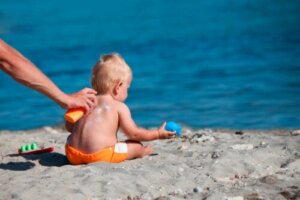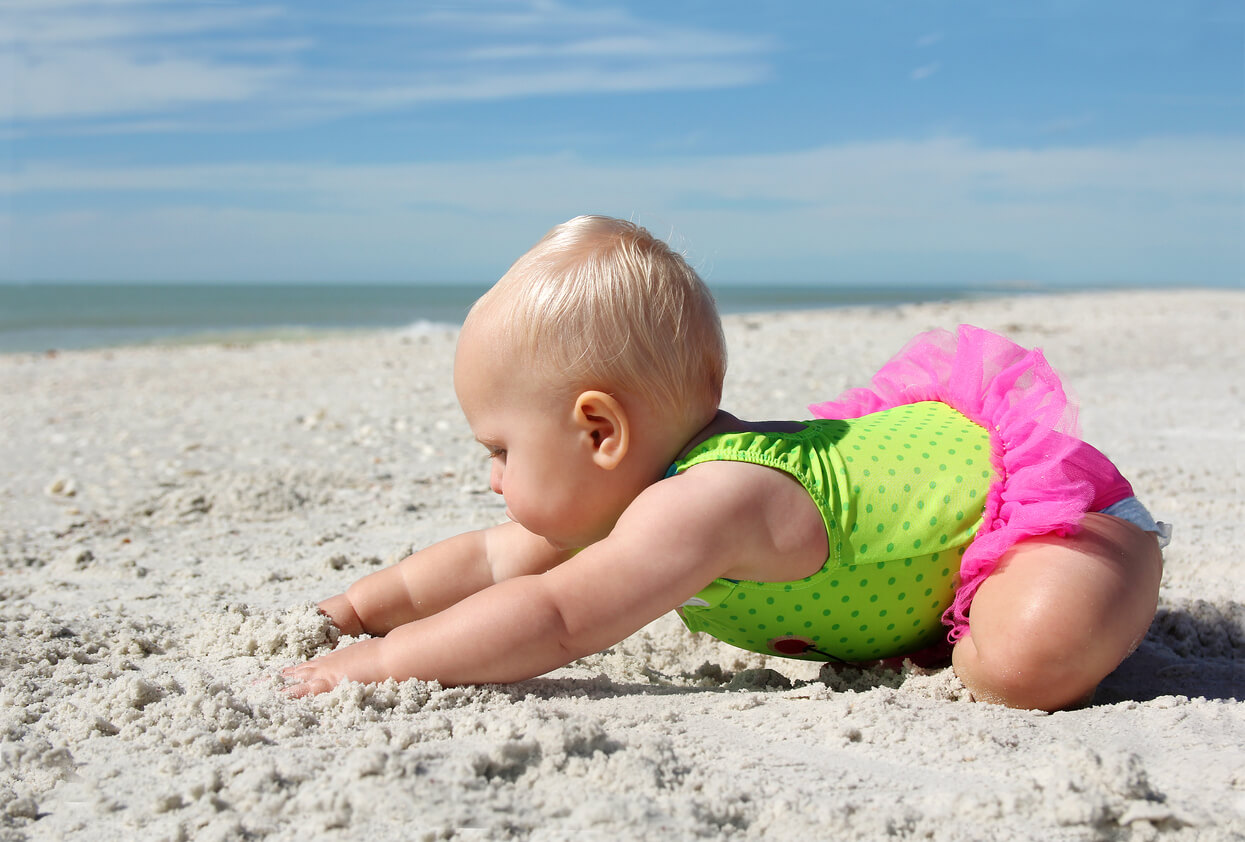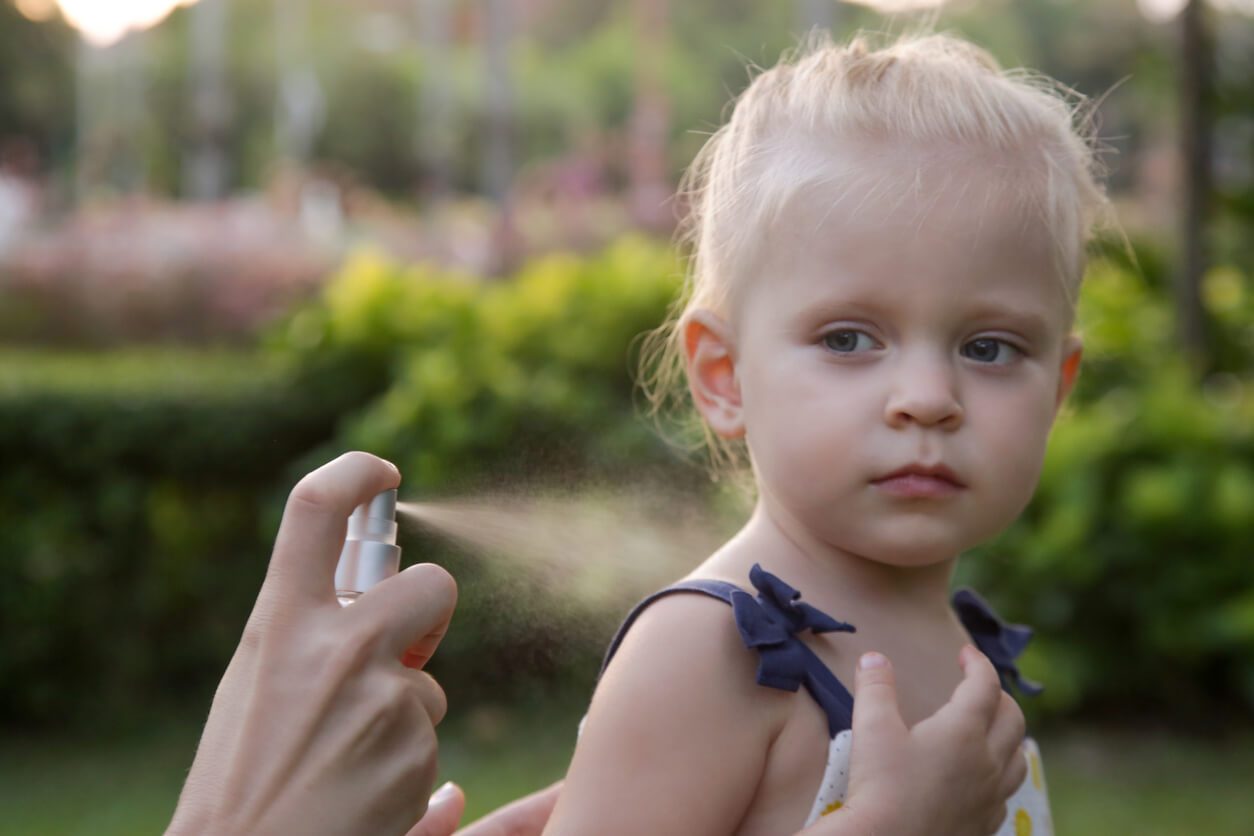Babies' Skin in the Summer: Care and Recommendations


Written and verified by the dermatologist Maria del Carmen Hernandez
Babies’ skin in the summer must be protected with extreme care because of its delicacy and sensitivity. Likewise, humidity and heat must be prevented, as they can alter the balance within the infant’s organism and cause serious conditions. Here are some tips on how to take care of your baby. Interested? Then keep reading!
Recommendations for taking good care of babies’ skin in the summer
During the summer months, concerns about caring for babies’ sensitive and delicate skin increase. However, if the necessary measures are taken, damage caused by ultraviolet (UV) rays and heat can be avoided.
Moisturize the skin correctly
Keeping infants’ skin properly moisturized is essential during the hottest months. For this purpose, there are many hypoallergenic and specific creams for sensitive skin on the market.
However, in the diaper area, it’s best to apply ointments or denser preparations that create an insulating film against irritants and the effects of physical rubbing. In addition, these products are indicated to stimulate the regeneration of the skin surface and prevent tissue dehydration. For this purpose, experts recommend the use of panthenol and provitamin B5.

Avoid exposure to UV rays
During the summer, we’re usually more exposed to the sun, as the vast majority of recreational activities take place outdoors. However, the Skin Cancer Foundation recommends controlling the time of day and amount of UV exposure in infants under one year of age. As a general rule, it’s best to avoid the time between 10 a.m. and 4 p.m. when the sun’s rays are most aggressive.
In contrast, newborns and young infants have thinner, more delicate, and fragile skin, which is characterized by the immaturity of their natural defense mechanisms and the inability to regulate body temperature. For this reason, the American Academy of Dermatology Association advises against direct exposure of babies under one year of age to the sun’s rays.
Use sun protection measures
Sunscreen as a care and prevention measure against sun damage is recommended only from the age of 6 months. In fact, for children under this age, it’s best to avoid direct sun exposure and stay in the shade.
Hats are excellent complements to reduce the negative effects of UV rays and allow covering more areas of the body to avoid heat stroke. Those accessories with wide brims are the most suitable, as they protect the eyes, ears, nose, scalp, and forehead.
Choosing the right clothing
During the summer, it’s ideal to wear loose-fitting, lightweight clothing, preferably made of natural fibers that facilitate skin perspiration, such as linen and cotton. It’s also recommended that the garments cover as much of the skin surface as possible.
However, it’s important to know that the garment itself doesn’t block the sun’s rays, but helps to minimize their effects. In order to completely block the action of the sun’s rays, there are fabrics with UV protection, which are identified through labeling detailing the ultraviolet protection factor (UPF). In fact, according to a study conducted by Cancer Research, the higher the factor, the more protection the clothing will provide.
Apply insect repellent

During the summer, the sudden changes in temperature and the various outdoor activities require us to take extreme care of our skin. Among them, it’s important to consider the presence of insects and avoid bites.
However, it’s important to know that you shouldn’t mix sunscreen and repellent. Rather, the proper way to apply them is to apply the sunscreen first and, after 30 minutes, proceed with the repellent. Likewise, it’s better to avoid the use of cosmetics and perfumes with dyes that may cause irritation or hypersensitivity reactions in the child’s dermis.
Change diapers regularly
Always make sure that your baby’s diapers are breathable and comfortable to reduce the risk of developing dermatitis in the anogenital area. In addition, it’s best to change them frequently, along with cleaning and moisturizing the area.
Hygiene is extremely important to keep the skin barrier healthy and functional. Baths shouldn’t be taken with very hot water, nor should they last too long in order to avoid dehydration of the skin or aggravate atopic dermatitis. It’s also a good idea to dry them with a clean and soft towel, especially in the folds of the knees and arms, to prevent erythema.
Finally, while you should change diapers frequently, it’s also a good idea to leave the little ones with their skin uncovered from time to time.
The importance of protecting babies’ skin in the summer
The protection of babies’ skin becomes more important during the summer months. Due to their sensitivity, the sun’s rays can cause different skin lesions if the right measures are not taken.
Children under 6 months of age should not be exposed to direct sunlight, so the first option is always to keep them in the shade. In addition, it is advisable to complement protection with physical barriers such as hats and clothing.
Babies’ skin in the summer must be protected with extreme care because of its delicacy and sensitivity. Likewise, humidity and heat must be prevented, as they can alter the balance within the infant’s organism and cause serious conditions. Here are some tips on how to take care of your baby. Interested? Then keep reading!
Recommendations for taking good care of babies’ skin in the summer
During the summer months, concerns about caring for babies’ sensitive and delicate skin increase. However, if the necessary measures are taken, damage caused by ultraviolet (UV) rays and heat can be avoided.
Moisturize the skin correctly
Keeping infants’ skin properly moisturized is essential during the hottest months. For this purpose, there are many hypoallergenic and specific creams for sensitive skin on the market.
However, in the diaper area, it’s best to apply ointments or denser preparations that create an insulating film against irritants and the effects of physical rubbing. In addition, these products are indicated to stimulate the regeneration of the skin surface and prevent tissue dehydration. For this purpose, experts recommend the use of panthenol and provitamin B5.

Avoid exposure to UV rays
During the summer, we’re usually more exposed to the sun, as the vast majority of recreational activities take place outdoors. However, the Skin Cancer Foundation recommends controlling the time of day and amount of UV exposure in infants under one year of age. As a general rule, it’s best to avoid the time between 10 a.m. and 4 p.m. when the sun’s rays are most aggressive.
In contrast, newborns and young infants have thinner, more delicate, and fragile skin, which is characterized by the immaturity of their natural defense mechanisms and the inability to regulate body temperature. For this reason, the American Academy of Dermatology Association advises against direct exposure of babies under one year of age to the sun’s rays.
Use sun protection measures
Sunscreen as a care and prevention measure against sun damage is recommended only from the age of 6 months. In fact, for children under this age, it’s best to avoid direct sun exposure and stay in the shade.
Hats are excellent complements to reduce the negative effects of UV rays and allow covering more areas of the body to avoid heat stroke. Those accessories with wide brims are the most suitable, as they protect the eyes, ears, nose, scalp, and forehead.
Choosing the right clothing
During the summer, it’s ideal to wear loose-fitting, lightweight clothing, preferably made of natural fibers that facilitate skin perspiration, such as linen and cotton. It’s also recommended that the garments cover as much of the skin surface as possible.
However, it’s important to know that the garment itself doesn’t block the sun’s rays, but helps to minimize their effects. In order to completely block the action of the sun’s rays, there are fabrics with UV protection, which are identified through labeling detailing the ultraviolet protection factor (UPF). In fact, according to a study conducted by Cancer Research, the higher the factor, the more protection the clothing will provide.
Apply insect repellent

During the summer, the sudden changes in temperature and the various outdoor activities require us to take extreme care of our skin. Among them, it’s important to consider the presence of insects and avoid bites.
However, it’s important to know that you shouldn’t mix sunscreen and repellent. Rather, the proper way to apply them is to apply the sunscreen first and, after 30 minutes, proceed with the repellent. Likewise, it’s better to avoid the use of cosmetics and perfumes with dyes that may cause irritation or hypersensitivity reactions in the child’s dermis.
Change diapers regularly
Always make sure that your baby’s diapers are breathable and comfortable to reduce the risk of developing dermatitis in the anogenital area. In addition, it’s best to change them frequently, along with cleaning and moisturizing the area.
Hygiene is extremely important to keep the skin barrier healthy and functional. Baths shouldn’t be taken with very hot water, nor should they last too long in order to avoid dehydration of the skin or aggravate atopic dermatitis. It’s also a good idea to dry them with a clean and soft towel, especially in the folds of the knees and arms, to prevent erythema.
Finally, while you should change diapers frequently, it’s also a good idea to leave the little ones with their skin uncovered from time to time.
The importance of protecting babies’ skin in the summer
The protection of babies’ skin becomes more important during the summer months. Due to their sensitivity, the sun’s rays can cause different skin lesions if the right measures are not taken.
Children under 6 months of age should not be exposed to direct sunlight, so the first option is always to keep them in the shade. In addition, it is advisable to complement protection with physical barriers such as hats and clothing.
All cited sources were thoroughly reviewed by our team to ensure their quality, reliability, currency, and validity. The bibliography of this article was considered reliable and of academic or scientific accuracy.
- Gambichler T, Altmeyer P, Hoffmann K. Role of clothes in sun protection. Recent Results Cancer Res. 2002;160:15-25. doi: 10.1007/978-3-642-59410-6_3. PMID: 12079208.
- Sun-Safe Babies. [Internet] Disponible en: https://www.skincancer.org/blog/sun-safe-babies/
- Stettler H, Kurka P, Wagner C, Sznurkowska K, Czernicka O, Böhling A, Bielfeldt S, Wilhelm KP, Lenz H. A new topical panthenol-containing emollient: skin-moisturizing effect following single and prolonged usage in healthy adults, and tolerability in healthy infants. J Dermatolog Treat. 2017 May;28(3):251-257. doi: 10.1080/09546634.2016.1218417. Epub 2016 Aug 22. PMID: 27545858.
- Infant sun protection: how parents can keep the baby safe. [Internet] Disponible en: https://www.aad.org/public/diseases/skin-cancer/prevent/sun-babies
This text is provided for informational purposes only and does not replace consultation with a professional. If in doubt, consult your specialist.








